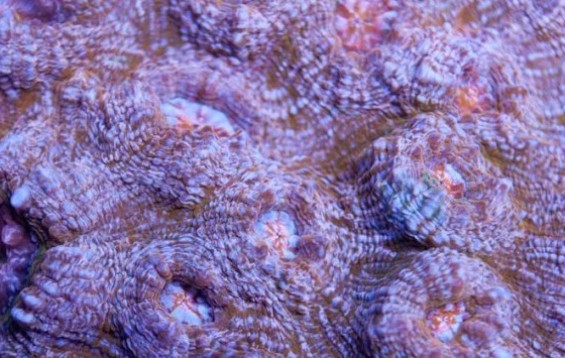- Name:
Creamsicle Chalice
(View AKA's) - Family: Pectiniidae
- Species: Echinophyllia
- Scientific Name: Echinophyllia sp


General info about Creamsicle Chalice
In general, species from Echinophyllia has an encrusting growth where their colonies can form folds or cups. The corallites that are located at the middle are usually elevated with warty bumps. The color of their mouth usually has a different color from their fleshy body.
For the Creamsicle Chalice Echinophyllia, they are predominatly colored violet with pink mouth. This are the water parameters for cultivating Creamsicle Chalice Echinophyllia:
- Calcium: 380 - 430 ppm
- Alkalinity: 3.2 - 4.8 MEQ/L
- Phosphates: 0
- Magnesium: 1200 - 1350
- Strontium: 8 - 10
- Temperature: 74° - 82° F (23° - 27° C)
- Salinity / Specific Gravity: 1.023 - 1.025
Creamsicle Chalice Diet & Nutrition
The Creamsicle Chalice Echinophyllia gets much of its nutrition from the symbiotic zooxanthellae living within their tissues. However, we still recommend you do supplemental feeding by adding mysis and brine shrimp.
Fragging / Propagating Creamsicle Chalice
A mature tank is recommended in cultivating Creamsicle Chalice Echinophyllia. They are highly adaptive that it can grow and encrust any surface, including the glass component of your tank.
Flow / Lighting Requirements for Creamsicle Chalice
The Creamsicle Chalice Echinophyllia requires moderate lighting and low to moderate waterflow. If they are exposed to strong waterflow, their tentacles wiill not go out, which in turn, will deprive them from feeding.
Parasites & Diseases that Affect Creamsicle Chalice
The Creamsicle Chalice Echinophyllia are prone to brown jelly infection, especially if water conditions are not met and maintained.
Creamsicle Chalice Origin
The Creamsicle Chalice Echinophyllia can be found in the waters of the Indo-Pacific Ocean.
Caution Should be Taken with Creamsicle Chalice
The Creamsicle Chalice Echinophyllia has an aggressive behavior. Therefore, proper spacing must be maintained with regards to nearby corals.
How to Acclimate Creamsicle Chalice
The Creamsicle Chalice Echinophyllia are purely marine, therefore, salinity must be maintained thoroughly at 1.023 to 1.025 specific gravity.
Stinging Tentacles on Creamsicle Chalice
The tentacles of the Creamsicle Chalice Echinophyllia are classfied as sweeper tentacles where it can extend, invade and sting nearby corals.
Original Detail
| Name | Species | Family | Scientific Name | More Detail | Added by |
|---|---|---|---|---|---|
| Creamsicle Chalice | Echinophyllia | Pectiniidae | Echinophyllia sp | In general, species from Echinophyllia has an encrusting growth where their colonies can form folds or cups. The corallites that are located at the middle are usually elevated with warty bumps. The color of their mouth usually has a different color from their fleshy body. For the Creamsicle Chalice Echinophyllia, they are predominatly colored violet with pink mouth. This are the water parameters for cultivating Creamsicle Chalice Echinophyllia:
|
PalaciosAn |
Changed by users
| Submitted Date | Submitted By | Status | Action |
|---|---|---|---|
| 2019-10-17 03:39:48 | PalaciosAn | Approved |


